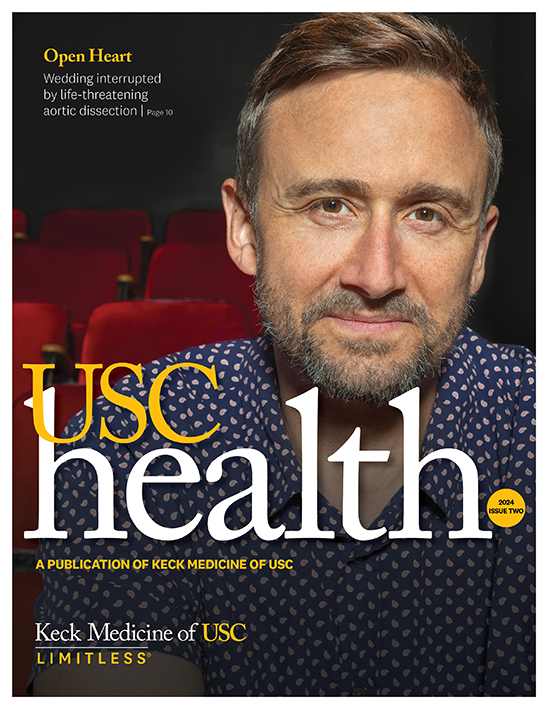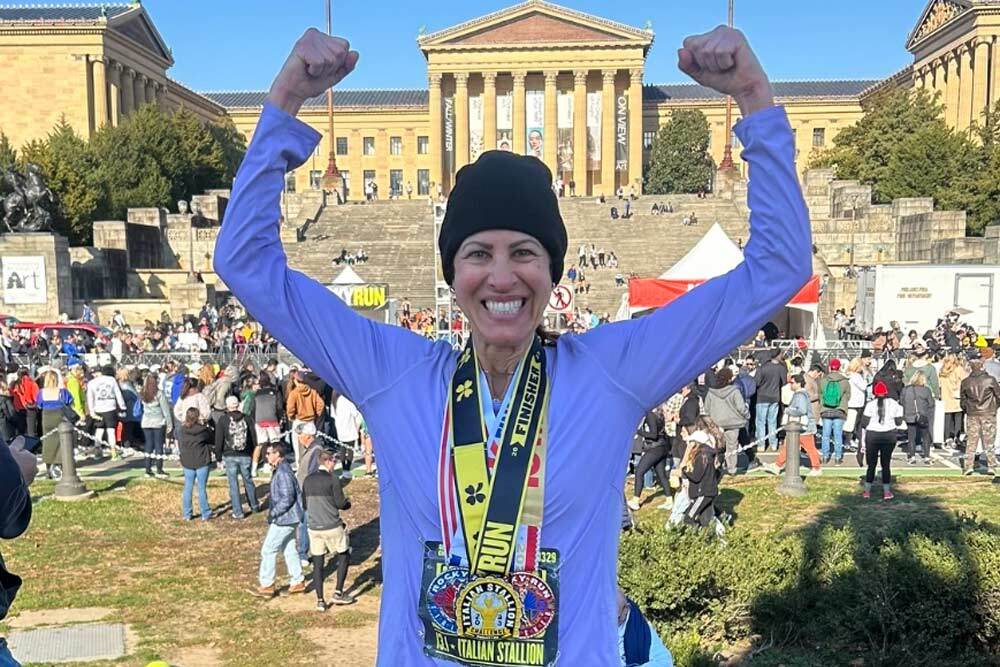
As an athlete, a nonsmoker and a health devotee, Linda Kneidinger was shocked to be diagnosed with lung cancer.
At 54 years old, Linda Kneidinger was in prime shape. An avid athlete who regularly ran 10Ks and half marathons, played numerous sports and maintained a healthy diet, Linda had always been in excellent health.
“I’ve always been the person to whom doctors would give a ‘gold star,’ telling me my health was great,” she says. “I was fortunate to grow up with healthy habits, in part because my dad was a family physician.”
When Linda was diagnosed with lung cancer in July 2024, she — and her family and friends — were shocked. “I do not have a family history of cancer at all,” she says. “I’ve never smoked. If someone was going to get lung cancer, no one suspected that I’d be the one.”
Linda’s primary care physician gave her a shortlist of medical specialists to consult. Linda chose Graeme Rosenberg, MD, a thoracic surgeon with USC Surgery and the USC Norris Comprehensive Cancer Center, part of Keck Medicine of USC.
Lung cancer without symptoms
Linda’s lung cancer was discovered by chance. In May 2024, Linda’s primary care physician sent her to get a calcium CT scoring test to measure the level of calcium in her coronary arteries because her cholesterol levels had risen. It was on this CT scan that the physician noticed an abnormality in Linda’s lungs and referred her to a specialist.
Linda says she knew Dr. Rosenberg was her first and only choice of specialist once she met him. “A lot of people told me I should get at least two, maybe three, different medical opinions, but as soon as I met Dr. Rosenberg, I just felt like this was the right person,” she says. “He’s the one who confirmed there were several markers indicating the possibility of cancer in the right middle lobe of my lungs.”
After ordering and reviewing the results of a PET scan, a pulmonary function test, a transbronchial biopsy (removal of some lung tissue) and a sample of her lymph nodes, Dr. Rosenberg confirmed that Linda had non-small cell lung cancer. The cancer was still at an early stage (stage 1B), and Dr. Rosenberg performed a lobectomy to remove Linda’s right middle lobe in July 2024 at Keck Hospital of USC.
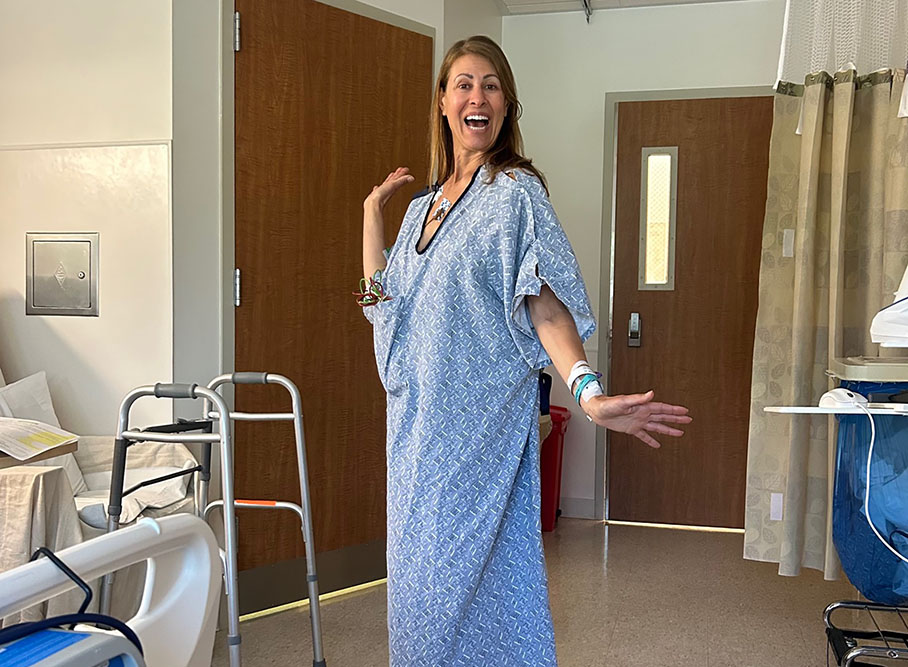
Linda explains why she opted for surgery. “Dr. Rosenberg is aggressively pro-health and knew how important health was to me. This is why he suggested being aggressive with treatment and going with surgery,” she says.
“She recovered really well at home, and relatively quickly,” Dr. Rosenberg adds. As a testament to Linda’s grit, he mentions that she ran a 5K race just two-and-a-half months after her lobectomy.
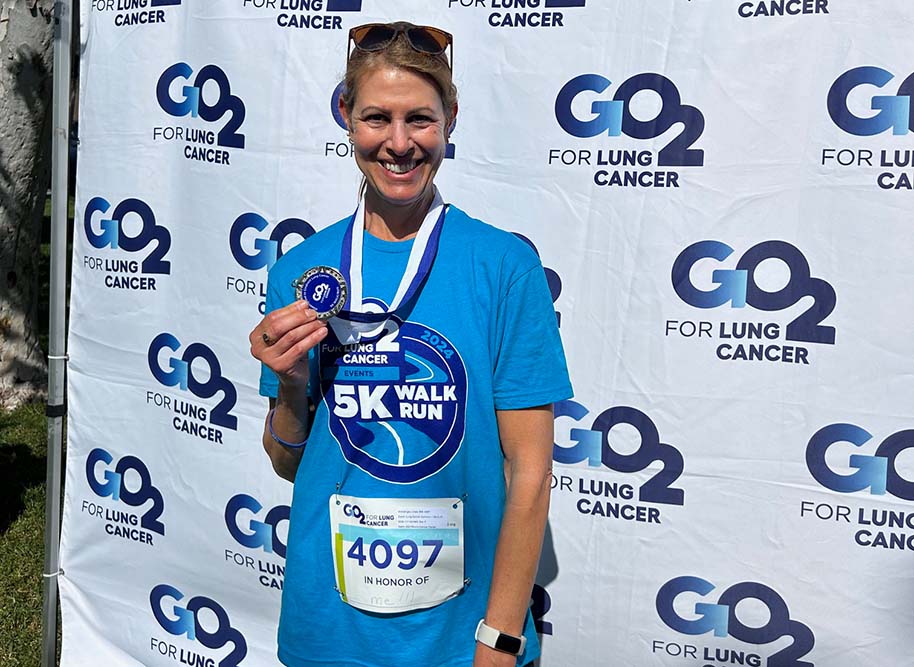
Why do nonsmokers develop lung cancer?
Linda is among the growing number of relatively young, healthy, nonsmoking adults — particularly women — being diagnosed with lung cancer.
“It’s a common misconception that lung cancer is a smoker’s disease,” Dr. Rosenberg says. “In fact, I treat more nonsmoking lung cancer patients than smoking-related lung cancer patients these days. It’s been a trend over the last 10-15 years.”
If someone was going to get lung cancer, no one suspected that I’d be the one.
Linda Kneidinger, patient, USC Norris Comprehensive Cancer Center
Short of detecting lung cancer by luck, detecting it in nonsmokers is especially difficult “because most lung cancers are asymptomatic until they’re in an advanced stage,” he says.
Linda, like many of the nonsmoking adults being diagnosed with lung cancer today, didn’t present with any apparent risk factors or symptoms. It was later determined that Linda had an EGFR gene mutation, which is a mutation commonly linked to lung cancer and most often found in nonsmoking women at a younger age.
Fortunately, EGFR is one of the gene mutations for which a specific, targeted drug has been developed. A month after her lobectomy, Linda was prescribed a daily oral drug called osimertinib, which is prescribed to some non-small cell lung cancer patients to prevent cancer cells from multiplying. Linda will continue taking the drug for three years and will be monitored for lung cancer long-term by both Dr. Rosenberg and by USC Norris medical oncologist Jorge Nieva, MD.
While she was nervous at the start after reading about potential side effects, Linda says Dr. Nieva encouraged her to pursue osimertinib treatment because it was known to be safe. “He said, ‘If you were my wife, I would 100% advise it,’” she recounts, adding that he pointed out that they were quite fortunate that her gene mutation had a medical treatment available.
Dr. Rosenberg agrees. “When you identify a gene mutation for which there is a targeted therapeutic, our surgeons, medical oncologists, pathologists and radiation oncologists then have the option of considering, in a multidisciplinary fashion, whether to pursue that additional therapy.”
Because Linda’s tumor was early stage, her treatment plan focused on osimertinib and not chemotherapy, immunotherapy and radiation. “Those decisions were made based on her specific pathology,” Dr. Rosenberg says. “None of her lymph nodes showed positive cancer signs, so our focus turned to addressing her genetic mutation.”
Advancing drugs for lung cancer
While great progress is being made in developing gene-specific drugs for lung cancer patients, more work also needs to be done to screen for and detect lung cancer early on in patients not obviously at risk of the disease.
“We need to continue investigating the independent risk factors we can use to plan screening protocols,” Dr. Rosenberg says.
Also, he adds, if lung cancer is suspected, seeing a specialist is important. “If an abnormality is found on a patient’s imaging — imaging that was obtained for some other reason — you need either a thoracic surgeon, a pulmonologist or someone with expertise in lung pathology to help decide on next steps because these can be very complex.”
Dr. Rosenberg says Linda’s outlook is good. “This was identified early and was treated aggressively,” he says. “She had favorable pathology both in that the cancer was early stage and not in the lymph nodes, and she had a mutation that we have a drug for.”
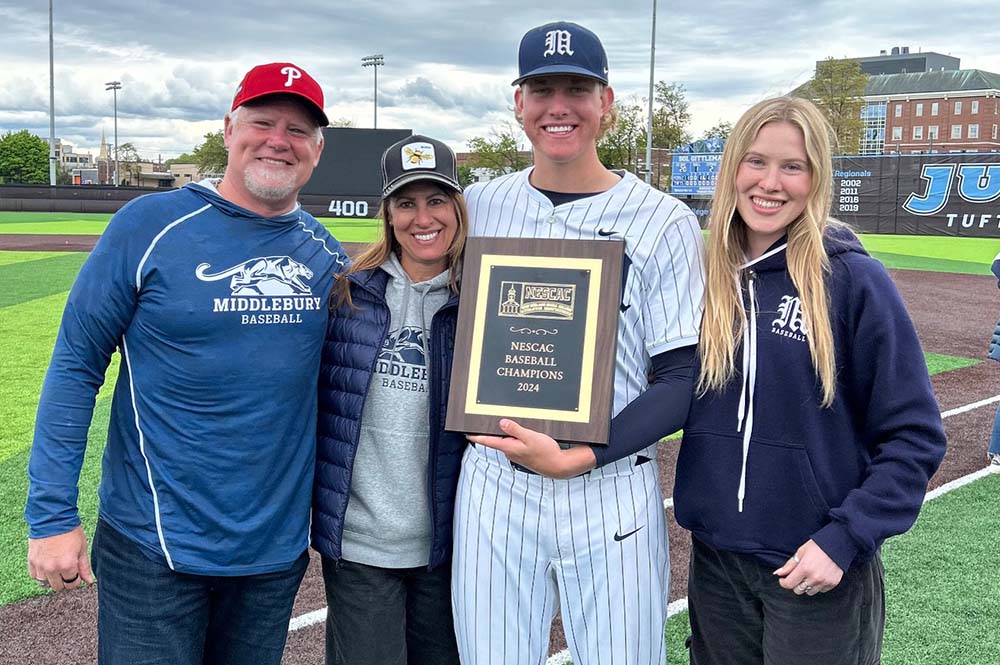
He adds, “Linda could develop another cancer. The likelihood is low, but it’s extremely hard to predict. We will continue to look for recurrence or any new primary lung cancer. Overall, I think her prognosis is excellent.”
Linda says she’s grateful for the care she received from the entire medical team at Keck Medicine. “Dr. Rosenberg speaks my language,” she says. “He has a positive mindset and assured me before surgery that if, by the end of the year, I wanted to run a half marathon, I could.”
She adds: “I’m so grateful for the way everyone at Keck Medicine operates as a team. I’ve read so many stories in social media about lung cancer patients having a hard time getting information from one doctor, then having to give the information to another doctor, and going back and forth. At Keck Medicine, this was all taken care of for me. I love it. They even coordinate appointments for me. It feels really nice to know there are other people out there advocating for you.”
Topics


